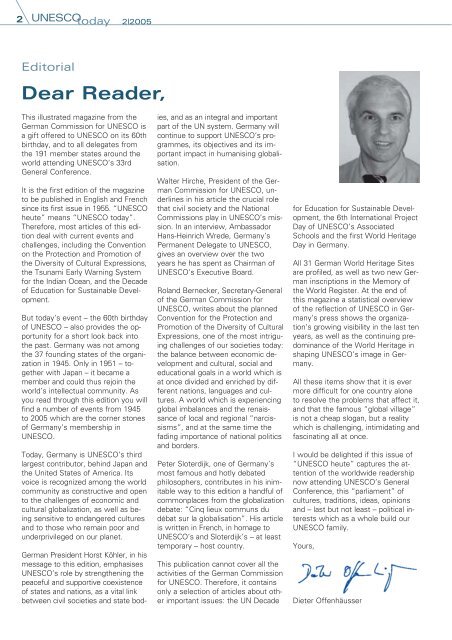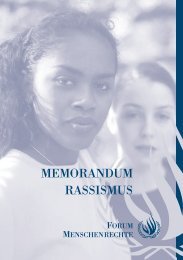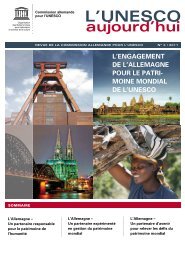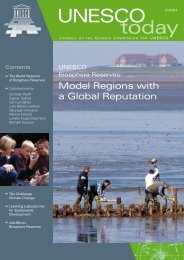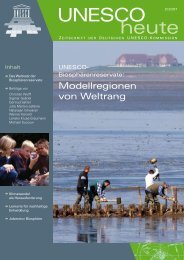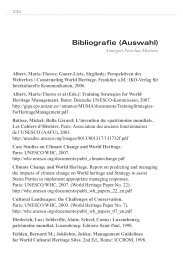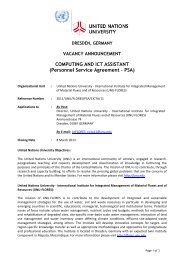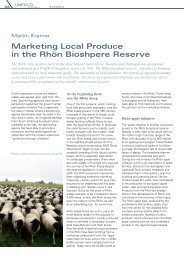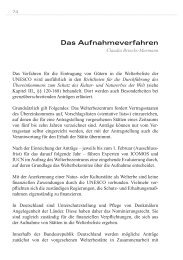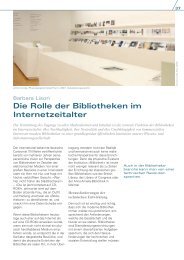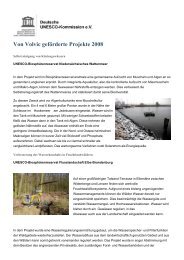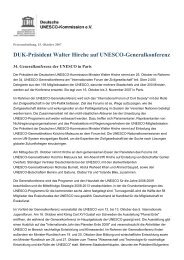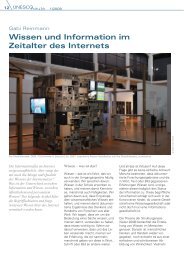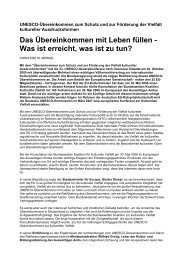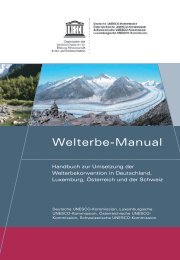Download - UNESCO Deutschland
Download - UNESCO Deutschland
Download - UNESCO Deutschland
You also want an ePaper? Increase the reach of your titles
YUMPU automatically turns print PDFs into web optimized ePapers that Google loves.
2 <strong>UNESCO</strong>today 2|2005<br />
Editorial<br />
Dear Reader,<br />
This illustrated magazine from the<br />
German Commission for <strong>UNESCO</strong> is<br />
a gift offered to <strong>UNESCO</strong> on its 60th<br />
birthday, and to all delegates from<br />
the 191 member states around the<br />
world attending <strong>UNESCO</strong>’s 33rd<br />
General Conference.<br />
It is the first edition of the magazine<br />
to be published in English and French<br />
since its first issue in 1955. “<strong>UNESCO</strong><br />
heute” means “<strong>UNESCO</strong> today”.<br />
Therefore, most articles of this edition<br />
deal with current events and<br />
challenges, including the Convention<br />
on the Protection and Promotion of<br />
the Diversity of Cultural Expressions,<br />
the Tsunami Early Warning System<br />
for the Indian Ocean, and the Decade<br />
of Education for Sustainable Development.<br />
But today’s event – the 60th birthday<br />
of <strong>UNESCO</strong> – also provides the opportunity<br />
for a short look back into<br />
the past. Germany was not among<br />
the 37 founding states of the organization<br />
in 1945. Only in 1951 – together<br />
with Japan – it became a<br />
member and could thus rejoin the<br />
world’s intellectual community. As<br />
you read through this edition you will<br />
find a number of events from 1945<br />
to 2005 which are the corner stones<br />
of Germany’s membership in<br />
<strong>UNESCO</strong>.<br />
Today, Germany is <strong>UNESCO</strong>’s third<br />
largest contributor, behind Japan and<br />
the United States of America. Its<br />
voice is recognized among the world<br />
community as constructive and open<br />
to the challenges of economic and<br />
cultural globalization, as well as being<br />
sensitive to endangered cultures<br />
and to those who remain poor and<br />
underprivileged on our planet.<br />
German President Horst Köhler, in his<br />
message to this edition, emphasises<br />
<strong>UNESCO</strong>’s role by strengthening the<br />
peaceful and supportive coexistence<br />
of states and nations, as a vital link<br />
between civil societies and state bod-<br />
ies, and as an integral and important<br />
part of the UN system. Germany will<br />
continue to support <strong>UNESCO</strong>’s programmes,<br />
its objectives and its important<br />
impact in humanising globalisation.<br />
Walter Hirche, President of the German<br />
Commission for <strong>UNESCO</strong>, underlines<br />
in his article the crucial role<br />
that civil society and the National<br />
Commissions play in <strong>UNESCO</strong>’s mission.<br />
In an interview, Ambassador<br />
Hans-Heinrich Wrede, Germany’s<br />
Permanent Delegate to <strong>UNESCO</strong>,<br />
gives an overview over the two<br />
years he has spent as Chairman of<br />
<strong>UNESCO</strong>’s Executive Board.<br />
Roland Bernecker, Secretary-General<br />
of the German Commission for<br />
<strong>UNESCO</strong>, writes about the planned<br />
Convention for the Protection and<br />
Promotion of the Diversity of Cultural<br />
Expressions, one of the most intriguing<br />
challenges of our societies today:<br />
the balance between economic development<br />
and cultural, social and<br />
educational goals in a world which is<br />
at once divided and enriched by different<br />
nations, languages and cultures.<br />
A world which is experiencing<br />
global imbalances and the renaissance<br />
of local and regional “narcissisms”,<br />
and at the same time the<br />
fading importance of national politics<br />
and borders.<br />
Peter Sloterdijk, one of Germany’s<br />
most famous and hotly debated<br />
philosophers, contributes in his inimitable<br />
way to this edition a handful of<br />
commonplaces from the globalization<br />
debate: “Cinq lieux communs du<br />
débat sur la globalisation”. His article<br />
is written in French, in homage to<br />
<strong>UNESCO</strong>’s and Sloterdijk’s – at least<br />
temporary – host country.<br />
This publication cannot cover all the<br />
activities of the German Commission<br />
for <strong>UNESCO</strong>. Therefore, it contains<br />
only a selection of articles about other<br />
important issues: the UN Decade<br />
for Education for Sustainable Development,<br />
the 6th International Project<br />
Day of <strong>UNESCO</strong>’s Associated<br />
Schools and the first World Heritage<br />
Day in Germany.<br />
All 31 German World Heritage Sites<br />
are profiled, as well as two new German<br />
inscriptions in the Memory of<br />
the World Register. At the end of<br />
this magazine a statistical overview<br />
of the reflection of <strong>UNESCO</strong> in Germany’s<br />
press shows the organization’s<br />
growing visibility in the last ten<br />
years, as well as the continuing predominance<br />
of the World Heritage in<br />
shaping <strong>UNESCO</strong>’s image in Germany.<br />
All these items show that it is ever<br />
more difficult for one country alone<br />
to resolve the problems that affect it,<br />
and that the famous “global village”<br />
is not a cheap slogan, but a reality<br />
which is challenging, intimidating and<br />
fascinating all at once.<br />
I would be delighted if this issue of<br />
“<strong>UNESCO</strong> heute” captures the attention<br />
of the worldwide readership<br />
now attending <strong>UNESCO</strong>’s General<br />
Conference, this “parliament” of<br />
cultures, traditions, ideas, opinions<br />
and – last but not least – political interests<br />
which as a whole build our<br />
<strong>UNESCO</strong> family.<br />
Yours,<br />
Dieter Offenhäusser


